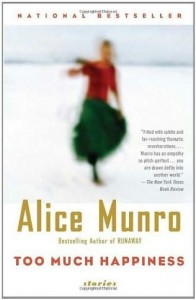I’ve been on a bit of an Alice Munro fest.
Here is the blurb …
Ten superb new stories by one of our most beloved and admired writers – the winner of the 2009 Man Booker International Prize.
In the first story a young wife and mother receives release from the unbearable pain of losing her three children from a most surprising source. In another, a young woman, in the aftermath of an unusual and humiliating seduction, reacts in a clever if less-than-admirable fashion. Other stories uncover the ‘deep-holes’ in a marriage, the unsuspected cruelty of children, and how a boy’s disfigured face provides both the good things in his life and the bad. And in the long title story, we accompany Sophia Kovalevsky – a late-nineteenth-century Russian émigré and mathematician – on a winter journey that takes her from the Riviera, where she visits her lover, to Paris, Germany, and, Denmark, where she has a fateful meeting with a local doctor, and finally to Sweden, where she teaches at the only university in Europe willing to employ a female mathematician.
With clarity and ease, Alice Munro once again renders complex, difficult events and emotions into stories that shed light on the unpredictable ways in which men and women accommodate and often transcend what happens in their lives.
Too Much Happiness is a compelling, provocative – even daring – collection.
This set of stories is classic Munro. Although, once again, I think collecting the stories by theme lessens their impact. They all end up being a bit too similar.
I found the big story in this one (about Sophia Kovalevsky) dragged a bit. I’m not sure why this is the case it sounds so interesting – a female mathematician in the 19th Century and she has a lover, but it was my least favourite of the stories.
More reviews …
http://longingtobe.wordpress.com/2011/06/12/too-much-happiness-alice-munro/
http://weloveliterature.com/2011/02/13/review-alice-munro-too-much-happiness/


Pingback: My BookClub Reviews » Blog Archive » New Selected Stories – Alice Munro
I agree that by compacting the stories of the book make it too similar. The first story of the first woman finding her three children dead could of been a novel all within itself.